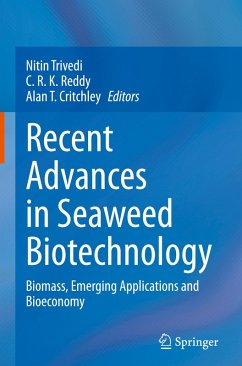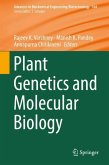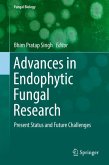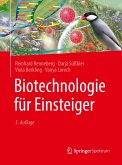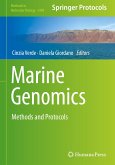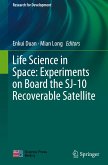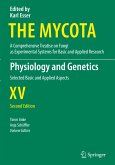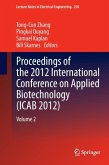Recent Advances in Seaweed Biotechnology
Emerging Application, Biomass, Bioeconomy
Herausgegeben:Trivedi, Nitin; Reddy, C.R.K.; Critchley, Alan T
Recent Advances in Seaweed Biotechnology
Emerging Application, Biomass, Bioeconomy
Herausgegeben:Trivedi, Nitin; Reddy, C.R.K.; Critchley, Alan T
- Gebundenes Buch
- Merkliste
- Auf die Merkliste
- Bewerten Bewerten
- Teilen
- Produkt teilen
- Produkterinnerung
- Produkterinnerung
This book delves into the realm of seaweed biotechnology, offering comprehensive insights into research, innovations, and emerging trends. It particularly highlights recent advancements in seaweed growth engineering, cultivation techniques, and the extraction of multiple bioproducts in a biorefinery fashion. Emphasizing the value addition of seaweed-derived bioproducts, the book also explores the translation of seaweed research into the establishment of seaweed-based startups.
Major themes covered include strategies for growth engineering and year-round seaweed biomass production,…mehr
Andere Kunden interessierten sich auch für
![Plant Genetics and Molecular Biology Plant Genetics and Molecular Biology]() Plant Genetics and Molecular Biology269,99 €
Plant Genetics and Molecular Biology269,99 €![Advances in Endophytic Fungal Research Advances in Endophytic Fungal Research]() Advances in Endophytic Fungal Research139,99 €
Advances in Endophytic Fungal Research139,99 €![Biotechnologie für Einsteiger Biotechnologie für Einsteiger]() Reinhard RennebergBiotechnologie für Einsteiger49,99 €
Reinhard RennebergBiotechnologie für Einsteiger49,99 €![Marine Genomics Marine Genomics]() Marine Genomics169,99 €
Marine Genomics169,99 €![Life Science in Space: Experiments on Board the SJ-10 Recoverable Satellite Life Science in Space: Experiments on Board the SJ-10 Recoverable Satellite]() Life Science in Space: Experiments on Board the SJ-10 Recoverable Satellite116,99 €
Life Science in Space: Experiments on Board the SJ-10 Recoverable Satellite116,99 €![Physiology and Genetics Physiology and Genetics]() Physiology and Genetics187,99 €
Physiology and Genetics187,99 €![Proceedings of the 2012 International Conference on Applied Biotechnology (ICAB 2012) Proceedings of the 2012 International Conference on Applied Biotechnology (ICAB 2012)]() Proceedings of the 2012 International Conference on Applied Biotechnology (ICAB 2012)155,99 €
Proceedings of the 2012 International Conference on Applied Biotechnology (ICAB 2012)155,99 €-
-
-
This book delves into the realm of seaweed biotechnology, offering comprehensive insights into research, innovations, and emerging trends. It particularly highlights recent advancements in seaweed growth engineering, cultivation techniques, and the extraction of multiple bioproducts in a biorefinery fashion. Emphasizing the value addition of seaweed-derived bioproducts, the book also explores the translation of seaweed research into the establishment of seaweed-based startups.
Major themes covered include strategies for growth engineering and year-round seaweed biomass production, technological advances in farming and land-based cultivation, biotechnological interventions for product development, and diverse applications in sectors such as food, feed, nutraceuticals, pharmaceuticals, agriculture, and cosmeceuticals. Additionally, it examines seaweed biorefinery models for commercial sustainability and their potential contributions to environmental monitoring and remediation efforts.
With a focus on fundamental biology and advanced technological interventions, this book encourages readers to explore the possibilities of macroalgae for societal benefits. It caters to university-level students of phycology, academics, practitioners in applied phycology, and aspiring entrepreneurs in the seaweed industry.
Hinweis: Dieser Artikel kann nur an eine deutsche Lieferadresse ausgeliefert werden.
Major themes covered include strategies for growth engineering and year-round seaweed biomass production, technological advances in farming and land-based cultivation, biotechnological interventions for product development, and diverse applications in sectors such as food, feed, nutraceuticals, pharmaceuticals, agriculture, and cosmeceuticals. Additionally, it examines seaweed biorefinery models for commercial sustainability and their potential contributions to environmental monitoring and remediation efforts.
With a focus on fundamental biology and advanced technological interventions, this book encourages readers to explore the possibilities of macroalgae for societal benefits. It caters to university-level students of phycology, academics, practitioners in applied phycology, and aspiring entrepreneurs in the seaweed industry.
Hinweis: Dieser Artikel kann nur an eine deutsche Lieferadresse ausgeliefert werden.
Produktdetails
- Produktdetails
- Verlag: Springer / Springer Nature Singapore / Springer, Berlin
- Artikelnr. des Verlages: 89235622, 978-981-96-0518-7
- Seitenzahl: 424
- Erscheinungstermin: 15. März 2025
- Englisch
- Abmessung: 235mm x 155mm
- ISBN-13: 9789819605187
- ISBN-10: 9819605180
- Artikelnr.: 71915117
- Herstellerkennzeichnung
- Springer-Verlag GmbH
- Tiergartenstr. 17
- 69121 Heidelberg
- +4962214870
- Verlag: Springer / Springer Nature Singapore / Springer, Berlin
- Artikelnr. des Verlages: 89235622, 978-981-96-0518-7
- Seitenzahl: 424
- Erscheinungstermin: 15. März 2025
- Englisch
- Abmessung: 235mm x 155mm
- ISBN-13: 9789819605187
- ISBN-10: 9819605180
- Artikelnr.: 71915117
- Herstellerkennzeichnung
- Springer-Verlag GmbH
- Tiergartenstr. 17
- 69121 Heidelberg
- +4962214870
Dr. Nitin Trivedi Dr. Nitin Trivedi is an Assistant Professor in the Department of Marine Biotechnology at Gujarat Biotechnology University in Gandhinagar, Gujarat, India. He received his Ph.D. in Biological Science from CSIR-CSMCRI in Bhavnagar, Gujarat, India, in 2015. Later, he worked as a Postdoctoral Fellow at DBT ICT CEB, Institute of Chemical Technology, Mumbai, from 2015 to 2017 and as a DST INSPIRE Faculty from 2017 to 2022. Since 2009, Dr. Trivedi has been working in the field of marine biotechnology, with a focus on seaweed biotechnology and marine microbial biotechnology. Dr. Trivedi has vast experience in seaweed biofuel, bioproducts, and biorefinery, as well as seaweed growth optimization, phycoremediation, and marine microbial enzymes. He has 35 research articles, including book chapters and reviews in SCI journals and two patents to his credit. as well as two patents. Dr. Trivedi has received several national and international fellowships/awards like DST INSPIRE Faculty, DSKPDF, CSIR-SRF, ARO PDF in Israel, PDF at Dalhousie University, Canada, Visiting Scientist at the University of Algarve, Portugal, guest researcher at the University of Messina, Italy. He has 7 years of teaching experience in microbiology and biotechnology subjects in UG, PG and PhD courses. Dr. Trivedi is affiliated to institutes of national and international importance as a research advisory committee member/examiner and also serving as a reviwer of several SCI journals/funding agencies. Dr. C.R.K. Reddy Dr. CRK Reddy is currently Head, Business Development (Tropical Seaweeds) at NPPL, Bangalore, and holds an Adjunct Professor position at the Institute of Chemical Technology (ICT-Mumbai), Mumbai, India. He has been exclusively focusing on marine macroalgae for more than three decades and current research interests span from seaweed production, product development and commercialization through the development of innovative and cutting-edge technologies complying with regulatory regimes and consumer market needs. In his research career, he had worked in various premier institutes of national and international reputation and had a long stint at CSIR-Central Salt Marine Chemicals Research Institute, Bhavnagar, Gujarat where he worked for more than 25 years in various capacities and contributed immensely to the cellar biotechnology of seaweeds besides taking active part in promotion and field implementation of seaweed farming technologies through active participation of coastal communities. He had a very long successful S&T career with several recognitions including awards, fellowships, and represented in several national scientific advisory committees besides serving the editorial board of scientific journals. He holds a distinguished record with established scientific credentials in S&T authoring more than 90 publications in SCI journals of high repute, 18 book chapters, 3 patents, and 5 books (some are edited). His research works have significantly contributed to the advancement of phycological research. Dr. Alan T. Critchley Alan T. Critchley grew up in Birmingham, UK. In 1981, he graduated with a PhD from Portsmouth University, in marine ecology, having been based at the university's Hayling Marine Laboratory studying the invasion of the brown seaweed Sargassum muticum. This was followed by a Royal Society European Postdoctoral Fellowship at the Delta Institute, Yerseke, Netherlands. He then moved to South Africa to teach in the Botany Department of the University of KwaZulu-Natal, Pietermaritzburg (7 years), and the University of the Witwatersrand, Johannesburg (10 years). He researched sub-tropical seaweeds to the east and cold-water, upwelling-influenced species to the west and developed a much keener interest in seaweed benefits and their applications. He also collaborated with Professor M. Ohno of Kochi University, Japan, to co-edit volumes of Seaweed Cultivation and Marine Ranching and Seaweed Resources of the World. In 1998, he moved to the University of Namibia, Windhoek, to become a research professor at the Multidisciplinary Research and Consultancy Centre; seaweeds and their uses were at the centre of a number of novel projects there. In 2001, he made the transition from academia to the commercial world. The call of carrageenan-bearing seaweeds took him to Normandy, France and a processing facility, then operated by Degussa Texturant Systems, to be in charge of their New Raw Materials Laboratory. It was at that time that his passion for the Eucheuma seaweeds, their biology, production, utilization and socio-economic importance, was fostered. It was here that he was most fortunate to begin collaborative research with Dr. Anicia Q. Hurtado. In 2005, he moved to Nova Scotia, Canada, to work with a small seaweed processing company. This role involved the management of multidisciplinary, collaborative projects based on commercial seaweeds (browns and reds). Ensuring sustainable production techniques for seaweed resources and the scientific validation of biostimulant and bioactive properties of extracts was a major focus. Carrageenophyte seaweeds continued as a research focus. It was through these activities that Dr Iain Neish and Alan were introduced. A common goal led Anne, Iain and Alan to co-edit Tropical Seaweed Farming (2017) and Tropical Seaweed Phyconomy (2024) both for Springer. Current collation of the broad spectrum of science associated with the Eucheuma seaweeds, their production, processing, applications and most importantly socio-economic contributions to coastal communities. He helped the Global Seafood Alliance publish their first standard on seaweed cultivation in 2023 and he has been a member of the science advisors for the Safe Seaweed Coalition, Now Global Seaweed Coalition.
Chapter 1 Seaweed-based proteins for vegan consumption and for animal nutrition as a substitute for soya.- Chapter 2 Strategies and major challenges in the manufacture, use and development of seaweed-based products for agriculture.- Chapter 3 Seaweed polyphenols: Challenges and future aspects of their processing and use.- Chapter4 Seaweed-Based Biomaterials for Emerging Biotechnological Applications.- Chapter5 Harnessing the Potential of Seaweeds and Their Associated Bacteria for Polyhydroxyalkanoates Biosynthesis.- Chapter6 Bioprospecting of seaweed secondary metabolites as emerging functional ingredients.- Chapter 7 A blueprint of global seaweed industry: challenges and future perspectives.- Chapter 8 An Eco-sustainable and Circular Economy - benefits and constrains.- Chapter 9 Seaweed-based proteins and peptides: processing and development of innovative products.- Chapter 10 Molecular mechanism for utilizing macroalgal polysaccharides by the human gut commensal bacteria.- Chapter 11 Phytoremediation potential of seaweeds: exploring their environmental cleanup capabilities.- Chapter 12 Brown seaweed biomass as potential raw material for biorefinery.- Chapter 13 Unravelling the Diversity, Functions and Applications of Seaweed Pigments.- Chapter 14 Seaweed Bioprocessing: A Gateway to Functional Ingredients in Nutraceuticals, Pharmaceuticals, Cosmetics, and Edible Salts.- Chapter 15 Present scenario of seaweed cultivation, existing challenges, and the way forward for sustainable culture in Bangladesh.- Chapter16 Bioplastics from Seaweeds: Current status and future perspectives.
Chapter 1 Seaweed-based proteins for vegan consumption and for animal nutrition as a substitute for soya.- Chapter 2 Strategies and major challenges in the manufacture, use and development of seaweed-based products for agriculture.- Chapter 3 Seaweed polyphenols: Challenges and future aspects of their processing and use.- Chapter4 Seaweed-Based Biomaterials for Emerging Biotechnological Applications.- Chapter5 Harnessing the Potential of Seaweeds and Their Associated Bacteria for Polyhydroxyalkanoates Biosynthesis.- Chapter6 Bioprospecting of seaweed secondary metabolites as emerging functional ingredients.- Chapter 7 A blueprint of global seaweed industry: challenges and future perspectives.- Chapter 8 An Eco-sustainable and Circular Economy - benefits and constrains.- Chapter 9 Seaweed-based proteins and peptides: processing and development of innovative products.- Chapter 10 Molecular mechanism for utilizing macroalgal polysaccharides by the human gut commensal bacteria.- Chapter 11 Phytoremediation potential of seaweeds: exploring their environmental cleanup capabilities.- Chapter 12 Brown seaweed biomass as potential raw material for biorefinery.- Chapter 13 Unravelling the Diversity, Functions and Applications of Seaweed Pigments.- Chapter 14 Seaweed Bioprocessing: A Gateway to Functional Ingredients in Nutraceuticals, Pharmaceuticals, Cosmetics, and Edible Salts.- Chapter 15 Present scenario of seaweed cultivation, existing challenges, and the way forward for sustainable culture in Bangladesh.- Chapter16 Bioplastics from Seaweeds: Current status and future perspectives.

